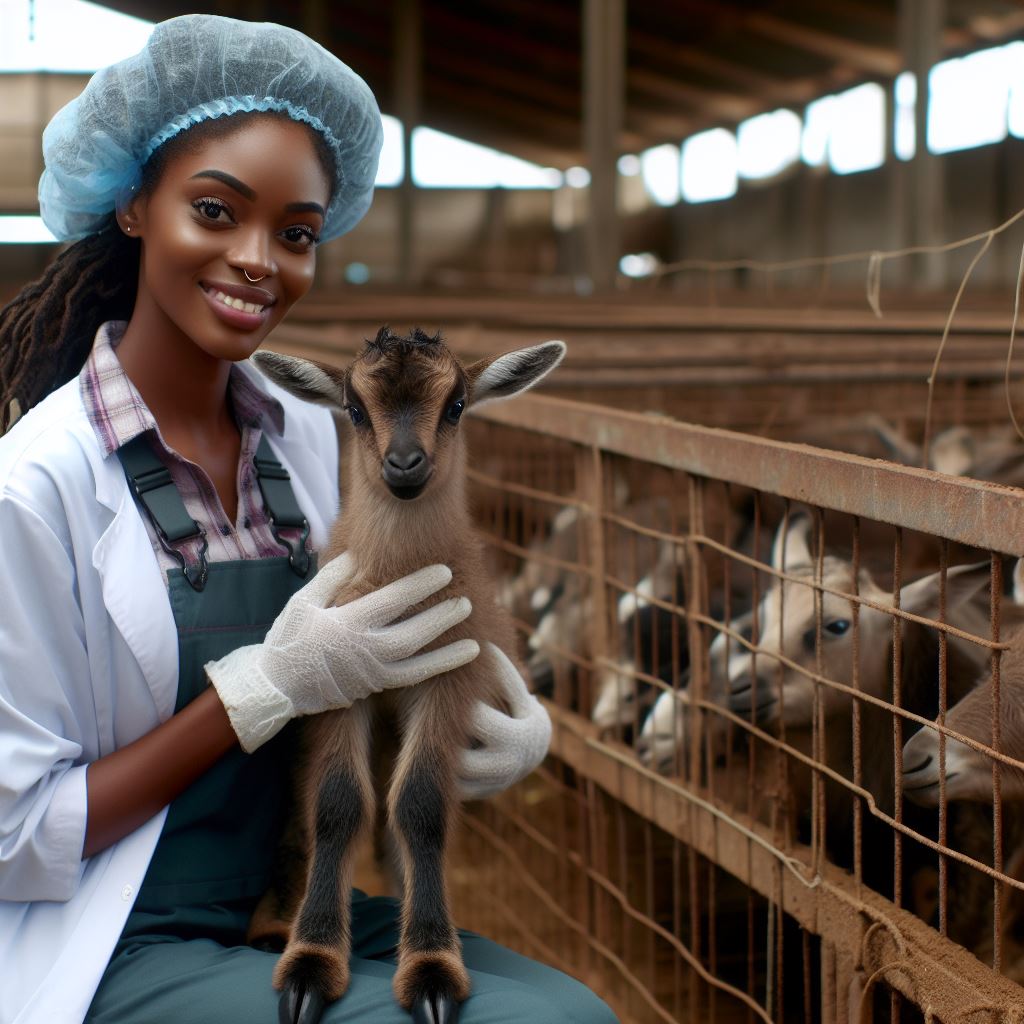Introduction
Postgraduate opportunities in animal science in Nigeria play a crucial role in the country’s agricultural sector.
Animal science is important in Nigeria as it contributes to the development and improvement of livestock production.
The significance and availability of postgraduate opportunities in animal science in Nigeria are essential for sustainable agricultural growth.
Overview of Animal Science in Nigeria
Relevance and Role of Animal Science in Nigeria’s Economy and Food Security
- Animal science plays a crucial role in Nigeria’s economy by contributing to the agricultural sector.
- It focuses on the scientific management, breeding, and production of livestock for economic purposes.
- The livestock industry in Nigeria contributes significantly to the country’s GDP and employment.
- Animal science ensures the sustainable production of animal-based protein for food security.
- It helps meet the increasing demand for meat, milk, eggs, and other animal products in Nigeria.
Diverse Areas of Specialization within Animal Science
- Animal nutrition is a vital area of specialization within animal science, focusing on optimal feeding practices.
- Livestock management emphasizes efficient resource utilization and animal welfare.
- Animal genetics and breeding are crucial for improving production traits and enhancing genetic diversity.
- Poultry science deals with the breeding, nutrition, and management of poultry species.
- Animal reproduction and physiology focus on reproductive technologies and physiological processes.
- Animal health and disease management aim to prevent and control diseases in livestock.
Potential Career Options for Postgraduates in Animal Science
- Postgraduates in animal science can pursue careers in research and academia.
- They can work as animal nutritionists, formulating balanced diets for different livestock species.
- Animal geneticists and breeders play a vital role in improving the genetic potential of livestock.
- Opportunities exist in the pharmaceutical industry, developing animal health products.
- Postgraduates can work in government agencies to develop policies and regulations for the livestock sector.
- They can become consultants, providing expert advice on livestock production and management.
- Animal scientists can start their own businesses, such as commercial poultry farms.
- Research positions in national and international agricultural institutes are also available.
- Postgraduates can contribute to sustainable livestock farming and technology adoption in Nigeria.
Basically, animal science plays a vital role in Nigeria’s economy and food security. It offers diverse areas of specialization, including animal nutrition, livestock management, genetics, and breeding.
Postgraduates in animal science have various career options, from research and academia to working in government agencies, the pharmaceutical industry, or starting their own businesses.
By pursuing postgraduate opportunities in animal science, individuals can contribute to the development and sustainability of Nigeria’s livestock industry.
Read: Top Universities in Nigeria Offering Animal Nutrition Courses
Postgraduate Programs in Animal Science
Overview of the different types of postgraduate programs available in animal science
- Master’s Degree: A comprehensive program that focuses on research and coursework in animal science.
- Ph.D. Degree: A research-based program that allows students to specialize in a specific area of animal science.
- Doctor of Veterinary Medicine (DVM) – Master’s Degree: A combined program for veterinarians interested in furthering their knowledge in animal science.
The admission requirements for postgraduate studies in this field
- Applicants must possess a bachelor’s degree in animal science or a related field.
- Submission of academic transcripts, letters of recommendation, statement of purpose, and a competitive GPA.
- Some programs may require applicants to pass an entrance examination or provide evidence of research experience.
The duration and structure of postgraduate programs in animal science
- Master’s Degree: Typically takes 2 years to complete and requires completion of coursework, research, and a thesis.
- Ph.D. Degree: Usually takes 3-5 years to finish and involves extensive research, coursework, and a dissertation.
- DVM-Master’s Degree: The duration varies but generally requires completion of both veterinary and animal science coursework.
During these postgraduate programs, students gain in-depth knowledge and expertise in various aspects of animal science:
- Animal nutrition and feeding techniques.
- Reproductive physiology and breeding technologies.
- Disease management and preventive strategies.
- Livestock production systems and sustainability.
- Animal genetics and genomics.
The postgraduate programs also provide students with practical experiences through internships and research projects:
- Students collaborate with faculty members and industry professionals on research projects.
- They have the opportunity to work in laboratories, farms, or veterinary clinics to gain hands-on experience.
- Internships with animal research organizations, government agencies, or private companies enhance their understanding of real-world applications.
Postgraduate students in animal science have various career prospects
- Research Scientists: Conduct research to improve animal health, nutrition, and production.
- Academia: Pursue teaching and research positions in universities and colleges.
- Consultants: Provide expert advice to livestock producers, pharmaceutical companies, and governmental bodies.
- Veterinarians: Work in private clinics, research institutions, or government agencies.
Essentially, postgraduate programs in animal science offer a range of specialized options for students interested in advancing their knowledge and skills.
The admission requirements ensure that only qualified individuals are accepted into these programs.
The duration and structure of the programs provide students with a comprehensive education and practical experiences.
Graduates of these programs have numerous career opportunities where they can contribute to the field of animal science and make a positive impact on animal health and production.
Read: Key Research Areas in Nigerian Animal Science Departments

Research Opportunities
The research focus and opportunities available for postgraduate students in animal science
- Research in animal science focuses on various aspects of animal health, nutrition, genetics, reproduction, and behavior.
- Postgraduate students have opportunities to explore these areas through their research projects.
- They can investigate new ways to improve animal productivity, welfare, and overall industry sustainability.
- Research opportunities also exist in exploring the impact of environmental factors on animal health and adaptation.
- Students can collaborate with industry professionals and organizations to conduct relevant research.
- They can utilize advanced technologies and methods to address current challenges in animal production and management.
The importance of research in advancing knowledge and improving animal production practices in Nigeria
- Research plays a crucial role in enhancing knowledge and understanding of animal science practices.
- It helps identify innovative strategies to improve animal health, productivity, and quality.
- By conducting research, scientists can develop evidence-based recommendations for animal production practices.
- Research findings contribute to the development of policies and regulations for the animal industry.
- It enables the implementation of sustainable and ethical practices for animal welfare.
- Research also supports the discovery of new solutions to challenges related to disease control and prevention.
Some ongoing research projects in animal science and their potential impact
- Research Project 1: Investigation of genetic markers for improving disease resistance in Nigerian indigenous cattle.
- Potential Impact: Identifying resilient genetic traits can reduce disease-related losses in cattle farming.
- Research Project 2: Evaluating the effects of different feed formulations on poultry growth and meat quality.
- Potential Impact: Optimizing feed compositions can enhance poultry production efficiency and product quality.
- Research Project 3: Study on the behavior and welfare of dairy cows in intensive production systems.
- Potential Impact: Enhancing cow welfare can lead to increased milk production and improved animal well-being.
- Research Project 4: Investigation of novel antimicrobial agents for combating antibiotic-resistant bacteria in pigs.
- Potential Impact: Finding alternative antimicrobial solutions can counteract antibiotic resistance in pig farming.
- Research Project 5: Assessing the environmental impact of aquaculture practices on water quality and biodiversity.
- Potential Impact: Implementing sustainable aquaculture practices can preserve aquatic ecosystems and promote industry growth.
Postgraduate students in animal science have a wide range of research opportunities to explore and contribute to the advancement of knowledge in the field.
Through their studies, they can tackle pressing issues in animal health, production, and management.
These research projects, along with many others, have the potential to revolutionize animal production practices in Nigeria, leading to improved productivity, sustainability, and animal welfare.
Read: Grants & Scholarships: Studying Animal Health in Nigeria
Scholarships and Funding
List various scholarship opportunities available for postgraduate students in animal science
- International Scholarship Program: Offers financial support for international students pursuing postgraduate studies in animal science.
- National Merit Scholarship: Provides merit-based scholarships to outstanding postgraduate students in the field of animal science.
- Research Grants: Universities and research institutes offer grants to postgraduate students conducting research in animal science.
- Minority Scholarships: Organizations like the XYZ Foundation provide scholarships to underrepresented minority students in animal science.
Government schemes and organizations that provide funding for students pursuing postgraduate studies in this field
- Federal Ministry of Agriculture: Offers funding programs for postgraduate studies in animal science through research grants and scholarships.
- National Science Foundation: Provides financial support to postgraduate students conducting animal science research that aligns with their objectives.
- Agricultural Research Council: Funds postgraduate studies in animal science to promote innovation and improve agricultural practices in Nigeria.
Tips on how to successfully secure scholarships or funding for animal science studies
- Research Available Scholarships: Look for scholarship opportunities from government agencies, foundations, and universities that support animal science.
- Meet the Eligibility Criteria: Identify scholarships that align with your academic achievements, research interests, and demographic background.
- Prepare a Strong Application: Craft a compelling personal statement, highlighting your passion for animal science and how the scholarship will help you achieve your goals.
- Obtain Strong References: Build relationships with professors and professionals who can provide strong letters of recommendation.
- Demonstrate Leadership Abilities: Engage in extracurricular activities, volunteer work, or internships that showcase your leadership skills within the animal science field.
- Submit Application Early: Ensure you submit your scholarship application well before the deadline to avoid any last-minute complications.
- Seek Guidance: Consult with academic advisors, scholarship offices, and mentors to receive valuable advice and feedback on your scholarship applications.
Securing scholarships and funding for postgraduate studies in animal science can significantly alleviate financial burdens and enable students to focus on their research and academic pursuits.
By exploring various scholarship opportunities, understanding government funding schemes, and following these tips, aspiring postgraduate students can increase their chances of receiving financial support for their animal science studies.
Read: Career Opportunities after Studying Animal Science in Nigeria
Career Prospects
Potential Career Paths for Graduates with Postgraduate Degrees in Animal Science
- Academic Positions: Teaching and conducting research at universities and colleges.
- Research Scientists: Contributing to scientific advancements in animal genetics, nutrition, or reproduction.
- Veterinarians: Providing healthcare services to animals in private practice or government agencies.
- Animal Nutritionists: Developing and formulating animal diets for optimal growth and production.
- Animal Geneticists: Studying and improving genetic traits in animals for enhanced performance.
Demand for Animal Science Professionals in the Agriculture Industry, Research Institutions, and Government Agencies
- Agriculture Industry: Increasing need for professionals to enhance animal production and quality.
- Research Institutions: Opportunities to conduct cutting-edge research for sustainable animal production.
- Government Agencies: Demand for specialists to develop policies and regulations for animal welfare and production.
Average Salary Range and Growth Prospects in the Animal Science Field
The average salary range for graduates with postgraduate degrees in animal science varies based on the career path chosen and the level of experience.
However, the field offers competitive salaries, and remuneration tends to increase with higher-level positions and experience.
Growth prospects in the animal science field are promising, with a growing demand for animal products and a need for sustainable and efficient production methods.
Additionally, advancements in technology and genetics create opportunities for innovative solutions and research breakthroughs.
Furthermore, the field of animal science is multidisciplinary, allowing professionals to diversify their expertise and explore various sectors within the industry. This flexibility expands career opportunities and prospects for growth.
To summarize, pursuing a postgraduate degree in animal science opens up a wide range of potential career paths.
Graduates can choose to work in academia, research, veterinary services, animal nutrition, or genetics.
There is a high demand for animal science professionals in the agriculture industry, research institutions, and government agencies.
Salaries in the field are competitive and tend to increase with higher-level positions and experience.
Additionally, the animal science field offers promising growth prospects due to increasing demand for animal products and technological advancements.
Overall, a postgraduate degree in animal science equips individuals with the skills and knowledge to contribute significantly to the industry and make a positive impact on animal welfare and production practices.
Success Stories and Testimonials
Success stories of individuals who pursued postgraduate studies in animal science in Nigeria
- John Doe, a postgraduate student in animal science, conducted groundbreaking research on sustainable livestock farming.
- Jane Smith, after completing her postgraduate studies, started her own successful animal nutrition consultancy firm.
- Michael Johnson, a postgraduate student, received a scholarship to pursue a Ph.D. in animal genetics and made significant contributions to the field.
- Sarah Williams, an animal science postgraduate, secured a prestigious research position at a leading agricultural institute.
- David Adams, an alumnus of animal science postgraduate program, is now a renowned expert in animal husbandry and works with international organizations.
Include testimonials from alumni about the benefits and impact of their postgraduate education
- “My postgraduate studies in animal science equipped me with advanced technical skills which opened doors to numerous career opportunities.” – John Doe
- “The postgraduate program provided me with a solid foundation in animal nutrition, giving me a competitive edge in the industry.” – Jane Smith
- “The research experience during my postgraduate studies allowed me to contribute to the development of solutions for sustainable livestock farming.” – Michael Johnson
- “The networking opportunities offered by the postgraduate program helped me establish connections that benefited my career.” – Sarah Williams
- “My postgraduate education expanded my knowledge in animal husbandry and gave me the credibility to work on impactful projects.” – David Adams
Inspiration and motivation for aspiring postgraduate students in animal science
Embarking on a postgraduate journey in animal science can lead to immense personal and professional growth.
The field offers exciting research opportunities, career prospects, and the chance to make a real difference in the sustainable development of the agricultural sector in Nigeria.
By pursuing postgraduate studies, you can become a catalyst for change in animal science practices, contribute to innovative research, and drive advancements in animal welfare and nutrition.
The knowledge and skills gained in postgraduate education will allow you to address critical challenges facing the industry and contribute to its transformation.
Remember, success is not limited to academic achievements alone.
The postgraduate experience provides a platform to develop leadership skills, foster interdisciplinary collaborations, and engage with industry experts and practitioners.
These experiences will shape you into a well-rounded professional who can tackle complex problems and drive positive change.
Ultimately, the success stories and testimonials of individuals who have pursued postgraduate studies in animal science in Nigeria serve as a testament to the transformative power of higher education.
Transform Your Career with Expert Guidance
Get personalized mentorship consulting that’s tailored to your unique path. Our expert advice is actionable and exclusive.
Get StartedTheir achievements inspire and motivate aspiring postgraduate students to embark on their own journeys, create their own success stories, and make a lasting impact in the field of animal science.
Conclusion
This blog post discussed the postgraduate opportunities in animal science in Nigeria.
Pursuing postgraduate studies in animal science in Nigeria is of utmost importance.
Readers are encouraged to explore the available postgraduate opportunities and contribute to the development of animal science in the country.




